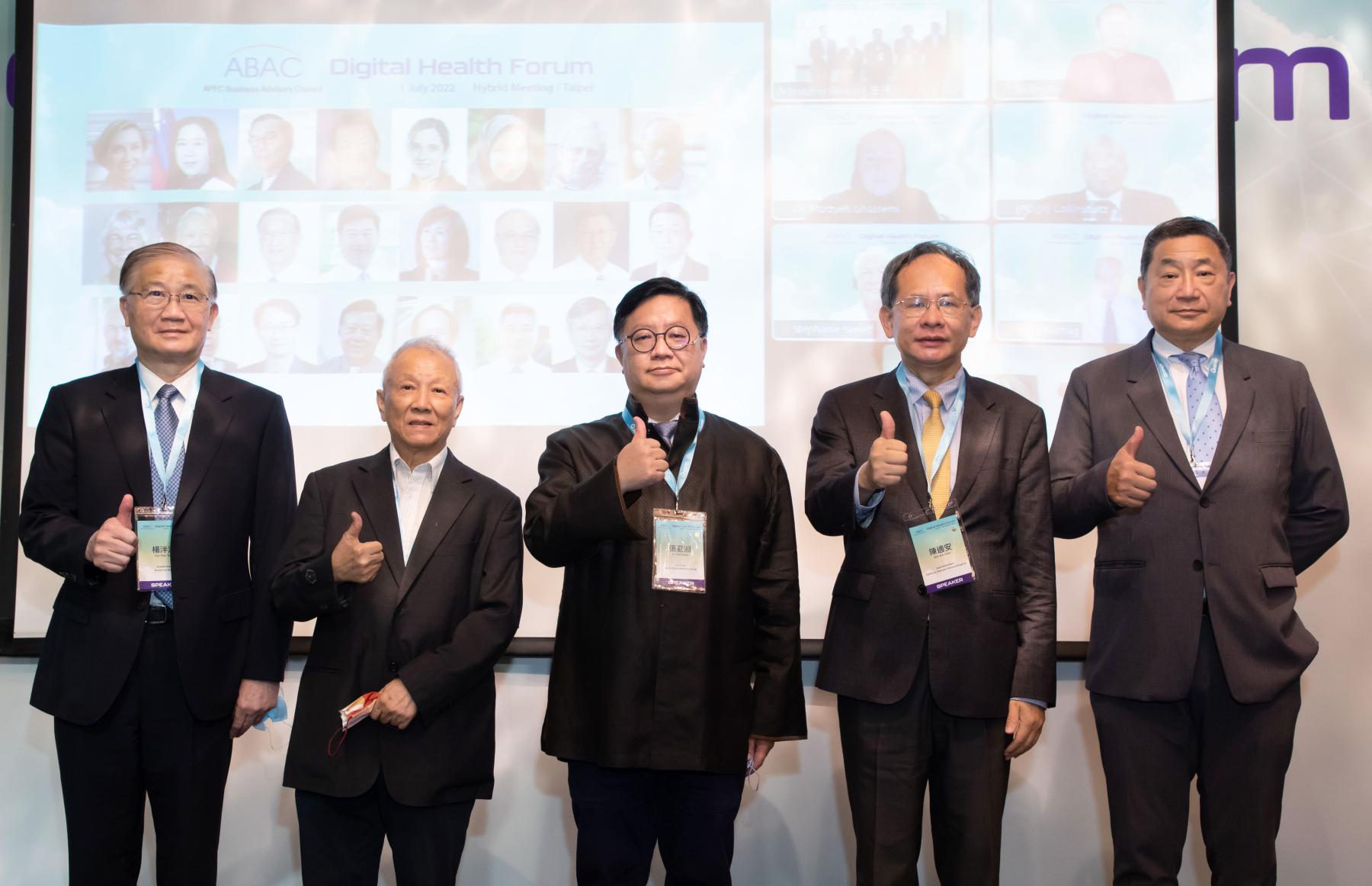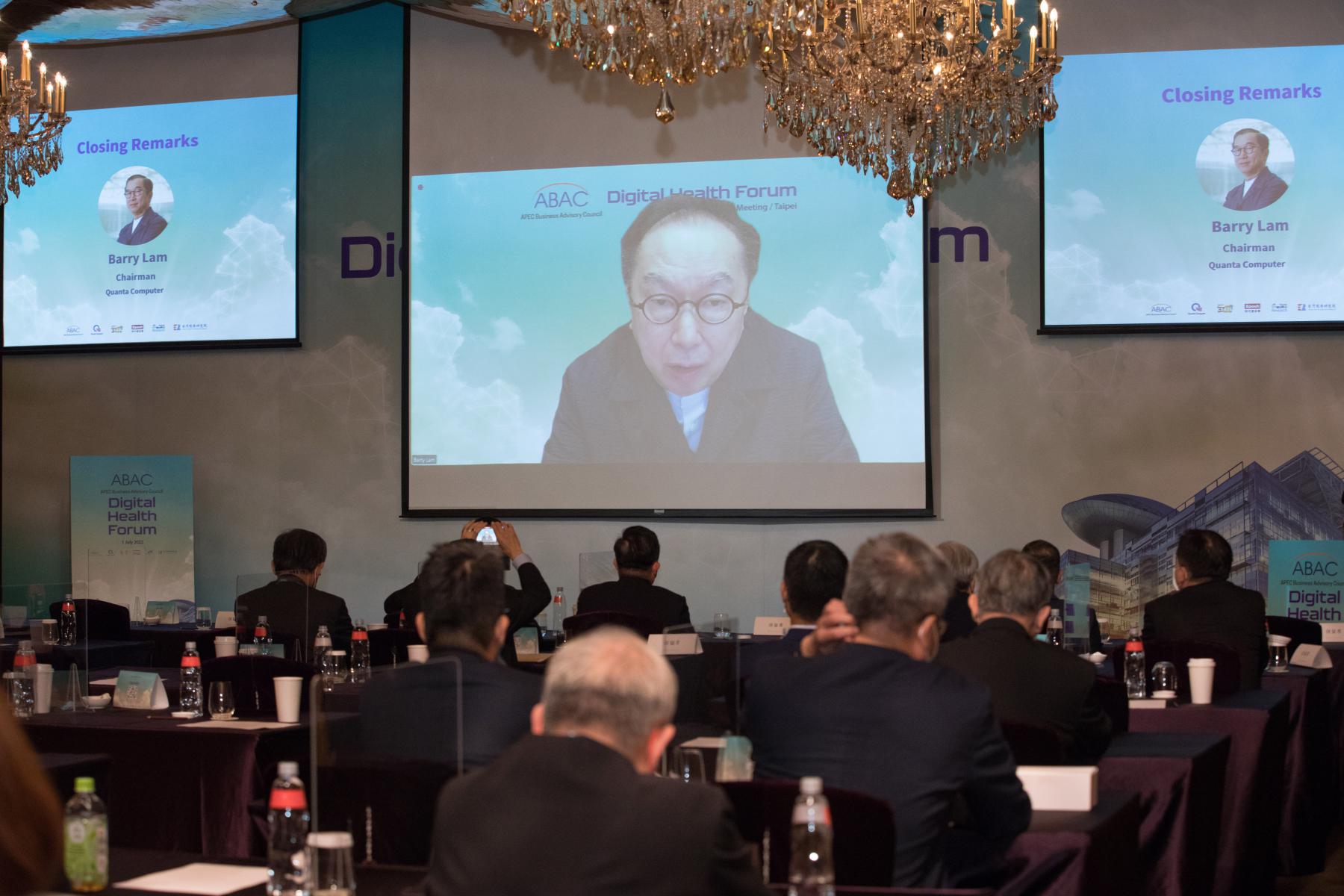2022 ABAC數位健康論壇 專家籲跨界合作、開放心態、導入基建為醫院數位健康轉型之關鍵
廣達電腦、廣達醫療科技基金會和APEC企業諮詢委員會(APEC Business Advisory Council, ABAC)我國秘書處共同舉辦之「2022 ABAC數位健康論壇」(2022 ABAC Digital Health Forum)於07月01日星期五於台北君品酒店盛大舉行。本論壇邀集美國麻省理工學院CSAIL、日本京都大學、加拿大西蒙菲沙大學(SFU)的頂尖教授群,以及國內各大頂尖醫學中心及醫療院所、標竿學術機構的專家學者們,各自依據豐富的智慧醫療研究與實務經驗,提供未來數位醫療轉型寶貴的建言。

與會講者合影。(圖/我國ABAC秘書處)
ABAC數位工作小組(DWG)主席Jan De Silva在致詞中表示,疫情加快我們在數位健康產業發展的腳步,目前全球數位健康市場規模達2170億美元,2030年預計成長至1.5兆美元;而光是亞太地區規模截至2022年已有500億美元,2030年估計可達3270億美元。她指出,無論是病患或醫生都有提升看診便利性及效率的需求,而AI、機器學習等科技普及遠距醫療與強化其效能,也帶來區域內潛在的龐大商機。APEC資深官員、外交部國際組織司吳尚年司長則表示,數位健康科技是維繫疫情期間醫療院所量能的關鍵,而我國身為全球醫療創新的領導者,展現了我國以大數據為基礎的健保數據庫是如何支持防疫工作。
ABAC數位工作小組共同主席、廣達電腦張嘉淵技術長接著分享廣達在精準健康與智慧醫療領域的發展策略。他表示,未來的趨勢是軟體、數據與演算法成為主流,這也是廣達在數位轉型朝向AI、Big Data、Cloud、Device、Edge、FinTech(ABCDEF)的原因,並發展「以人為本」的科技為核心。張技術長強調,廣達將持續致力發展AloT平台、研發智慧醫療設備和服務以及串聯各家醫院資源,為推廣遠距醫療和縮小城鄉差距做出貢獻。
本論壇同時由張嘉淵技術長主持專題講座,邀請國內醫界專家一同交流討論,席間均為國內重要龍頭教學醫院與醫學中心的權威代表,共同探討未來如何持續促進數位健康轉型與智慧醫療,與談專家們論及強化醫院和IT產業專家的跨界合作勢在必行,技術日新月異之下應持開放心態接納新科技、導入數位醫療基礎建設將是醫院進行數位健康轉型的關鍵。
廣達電腦林百里董事長為本論壇總結,他表示AI正引領醫療領域的革新,觸及精準健康、遠距醫療、年長者照護等面向,這場論壇呈現產官學合作在數位健康領域頗有建樹,他個人十分看好未來的發展。林董事長也提到,美國將為2023年APEC主辦方,廣達與亞太地區相關機構如MIT勢必能持續合作產生更多豐碩的成果。

廣達電腦林百里董事長。(圖/我國ABAC秘書處)
ABAC數位健康論壇的成果與建言,將發表於7月26至29日在越南召開之ABAC第三次大會,同時展現我國於數位健康資料應用領域之產出與貢獻。
[英文新聞稿]
2022 ABAC Digital Health Forum: Cross-Sector Collaboration, Infrastructure Introduction, Open Mindset as Keys to Achieve Digital Health Transformation in Hospitals, Experts said
Asia-Pacific experts on AI and digital health, meeting July 1st in 2022 ABAC Digital Health Forum, shared their expertise and ongoing projects to address real-world medical and healthcare problems with advanced technologies. Quanta Computer and the APEC Business Advisory Council (ABAC) Chinese Taipei Secretariat held the forum in a hybrid form.
In the opening remarks, ABAC Digital Working Group (DWG) Chair for 2022, Jan De Silva, said the global digital health market is worth 217 billion USD and is expected to grow to 1.5 trillion by 2030. The APAC market alone is worth nearly 50 billion in 2022, and is expected to grow to 327 billion by 2030. With more patients and physicians demanding efficient consultations and healthcare, AI and machine learning technologies popularize the telemedicine and its efficiency, which shows the opportunities for our region are enormous. “As Chinese Taipei is a global leader in medical innovation, we excel at integrating information technology and medical practices,” said APEC Senior Official Sharon Wu.
Quanta Computer CTO Dr. Ted Chang, who is serving as one of the Co-Chairs of DWG, shared the company’s strategies for the development of precise health and smart medicine. “In the future, it will no longer be about hardware, but instead related to software, data, and algorithm,” he said. This has made Quanta go on the path to develop AI, Big Data, Cloud, Device, Edge, and FinTech (ABCDEF), with human-centric technology as a core. Dr. Chang reiterated, that Quanta will devote itself to developing the AloT platform, smart medical devices and services, and connecting resources among hospitals, to contribute to the promotion of telemedicine and the reduction of urban-rural disparity.
The panel session moderated by Dr. Ted Chang gathered major local hospital executives to make recommendations for advancing digital health transformation. Experts considered cross-sector collaboration between hospitals and the IT industry, cultivating an open mindset embracing new technologies, and developing digital medicine infrastructure in hospitals are keys to achieving digital health transformation.
While delivering the closing remarks, Quanta Computer Chairman Barry Lam mentioned AI is revolutionizing health domains, such as precision health and smart medicine; telemedicine and telehealth; as well as aging in place. “As the United States is the APEC host next year and a leader in digital health, Quanta’s collaboration with MIT CSAIL and other organizations in the APEC region will surely generate greater momentum and success,” Chairman Lam said.
The outcome of this forum will be placed in a final report to ABAC. Highlights of the Forum will be further presented at ABAC 3 meetings in Ha Long, Viet Nam at the end of July.
Experts on AI and digital health have been invited to ABAC Digital Health Forum, such as MIT’s Computer Science and Artificial Intelligence Laboratory (CSAIL), Kyoto University Hospital, Simon Fraser University, as well as Chinese Taipei’s experts from top medical centers, hospitals, and academic institutions.